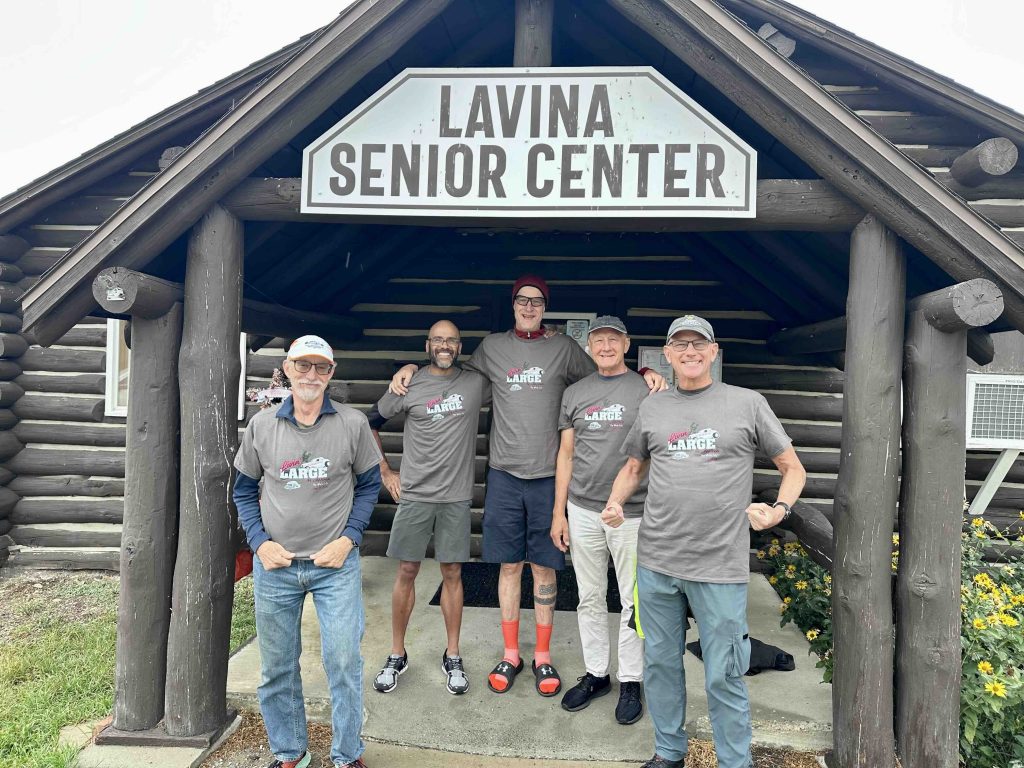
At 9:30, Robin returned, his grin undiminished.
“You came back!” I exclaimed. “Did you find the peanut-butter mud those guys promised?”
“The surface was OK. Wet and rutty after the pavement ended, but we didn’t sink in or get stuck.” The smile turned to a grimace. “It was the wind. Smack in our face.”
If Robin had given up, then surely none of the other riders would stand a chance. We loaded everybody into our two vehicles and set out to enjoy the day in other ways.
Even with the anti-sway engaged, I had to keep the Metris van at 55 mph or below despite the 70 mph speed limit in US 12. Along the way, Robin marveled, “You know, that guy at breakfast, the one who said ‘You can’t fix stupid’?” I nodded. “Just after I turned around, he comes by in a red pick-up, wanted to know how it was, if I were OK.”
“Maybe he was just riding out to work?”
“No, after I told him everything was fine, I was just going back to join the rest of you, he turned around back to town.”
“You mean he came out just to see how you were doing?”
“Uh-huh. Didn’t see that coming…”
“Well, I’ve found that people out away from cities are much nicer towards cyclists than you’d think. Once, in Iowa, when we left a bag at a small-town McDonald’s, I had a woman drive five miles just to give it back to us. You know, out here, there’s not a lot of help except what you get from your neighbors, so it’s ingrained to look out for each other. And also, I think, there’s a little paranoia on their part – they want to make sure you’re not up to no good.”
“Makes sense,” Robin said.
We made it to Lavina (population 143) a bit after 11. I parked in front of the Adams Hotel, a 100 year old restored white two story structure dominating the three-block long Main Street.
“It’s padlocked,” Satish noted when I rang the doorbell. A year earlier, Cheryl had sneaked in the side door, and toured the empty relic, filled with Victorian era antiques. But we had no tour that day.
While still windy, the rain had let up, so I suggested we complete the city tour. We passed a bank. It, too, was painted white. A standard “Open/Closed” sign hung inside on the front door. Where the business hours normally would be, they’d posted “Open: 1911. Closed: “1929”.
At the end of the third block, across from the city park, sat a log cabin, the sign above the door proudly proclaiming “Senior Center”. A few people milled around inside.
“I’m going in,” I said. “I’m a senior. Maybe we can get come local knowledge.
A front alcove featured a little stand with a cash box, and a sign next to a pile of grey T-shirts reading: “Reduced! $8” Another read, “Wednesday lunch price: Seniors $5. Under 60, $6.”
A woman, herself clearly a senior, walked around several tables, arranging chairs. “Are you here for lunch?” she asked warily. I realised that six others in or group had followed me in, and were milling about, looking distinctly foreign in their logo’d bike jackets as they studied the photographs lining the walls, all from an earlier, grander era in Lavina’s past.
“What’s for lunch?” I asked.
“Pulled pork sandwiches, soup…” came the reply. It was only 11:15, and I hoped to make it 20 miles down the road to Ryegate (pop 223), home to the annual Testical Festival where an actual café awaited.
“Um, we’re passing through on our way to Harlowton. I came here last year, to Lavina, to see the hotel, and wanted to show my friends the town,” I said.
“Where are you from?”
We went through the litany: Sierra foothills, Puget Sound, North Carolina Piedmont, Colorado Springs, Canadian Maritime.
“Oh my, all over!” she marveled. “Just touring?”
“Bike touring. But not today. Too windy.”
Tom and Rick came by holding up two of the grey t-shirts, which featured a racing coupe from the ‘30s, red flames gracing its white paint job; a pile of pancakes dripping syrup, eggs, and butt; “Livin’ LARGE in Lavina “The White City”; June 15, 2024.
A lady back in the front alcove chirped, “We sold two of the shirts!”
Rick asked, “White City? What’s that mean?”
“Oh, the town, long ago, all the buildings were painted white, so that’s what they called it back then.” Simple enough.
Suddenly filled with an overwhelming feeling of affection for the Senior Center, its cheery volunteers and Lavina’s on-going community, I went back to the front alcove, where half-a dozen white-haired denizens were slowly pulling out their five and ten dollar bills, getting change laboriously handed back to them as needed. I had to wait until that flurry of activity passed before I could hand over $24, from myself, Robin, and Satish, for the remaining three shirts.
The temperature in the room must have shot up 5 degrees from the warm appreciation the ladies at the desk expressed at having finally sold out all the shirts. I suspect our visit will be the stuff of lunch-time conversations at the Lavina Senior Center for weeks to come.
Outside, we donned our shirts and posed in front just to prove this really happened.
[To be Cont’d]
